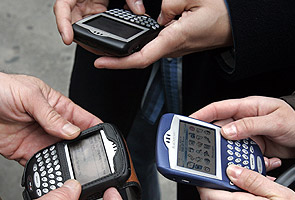- Home
- Mobiles
- Mobiles News
- RIM to allow only legal monitoring of BlackBerry data in India
RIM to allow only legal monitoring of BlackBerry data in India
By NDTV Correspondent | Updated: 6 June 2012 13:32 IST

Advertisement
After setting a deadline of August 31 for BlackBerry to provide access to corporate emails and messenger services, the government will meet the Canadian maker of the device, Research In Motion (RIM).
In a statement issued on Friday, RIM stated that it "has drawn a firm line" in offering "lawful access" to its services. The company says that while it supports governments all over the world in requirements that arise from national security, it cannot be asked to provide customers' encryption keys. It says it doesn't have the ability to do this anywhere in the world and that its security architecture is the same across the globe - a sign that reports that it has made concessions in countries like Saudi Arabia are incorrect. (Read: Full Text of RIM's Statement on Blackberry Battle)
RIM indicates that it is not willing to allow governments to access data sent using
BlackBerrys that security agencies in those countries wouldn't already be able to monitor if it were sent from smartphones made by competing manufacturers.
"Also driving RIM's position is the fact that strong encryption is a fundamental commercial requirement for any country to attract and maintain international business anyway and similarly strong encryption is currently used pervasively in traditional VPNs on both wired and wireless networks in order to protect corporate and government communications," its statement explains. (Watch: How BlackBerry encrypts emails)
India's ultimatum was issued hours after senior officials from government, intelligence and state-run telecom operators met to discuss how to gain access to BlackBerry content.
"If a technical solution is not provided by August 31, 2010, the government will review the position and take steps to block these two services from the network," a government spokesperson had said.
India wants access in a readable format to encrypted BlackBerry communication, on the grounds that it could be used by militants.
There are an estimated one million BlackBerry subscribers in the country.
In a statement issued on Friday, RIM stated that it "has drawn a firm line" in offering "lawful access" to its services. The company says that while it supports governments all over the world in requirements that arise from national security, it cannot be asked to provide customers' encryption keys. It says it doesn't have the ability to do this anywhere in the world and that its security architecture is the same across the globe - a sign that reports that it has made concessions in countries like Saudi Arabia are incorrect. (Read: Full Text of RIM's Statement on Blackberry Battle)
RIM indicates that it is not willing to allow governments to access data sent using
BlackBerrys that security agencies in those countries wouldn't already be able to monitor if it were sent from smartphones made by competing manufacturers.
"Also driving RIM's position is the fact that strong encryption is a fundamental commercial requirement for any country to attract and maintain international business anyway and similarly strong encryption is currently used pervasively in traditional VPNs on both wired and wireless networks in order to protect corporate and government communications," its statement explains. (Watch: How BlackBerry encrypts emails)
India's ultimatum was issued hours after senior officials from government, intelligence and state-run telecom operators met to discuss how to gain access to BlackBerry content.
"If a technical solution is not provided by August 31, 2010, the government will review the position and take steps to block these two services from the network," a government spokesperson had said.
India wants access in a readable format to encrypted BlackBerry communication, on the grounds that it could be used by militants.
There are an estimated one million BlackBerry subscribers in the country.
Comments
For the latest tech news and reviews, follow Gadgets 360 on X, Facebook, WhatsApp, Threads and Google News. For the latest videos on gadgets and tech, subscribe to our YouTube channel. If you want to know everything about top influencers, follow our in-house Who'sThat360 on Instagram and YouTube.
Further reading:
BlackBerry, RIM
Related Stories
Popular on Gadgets
- Samsung Galaxy Unpacked 2025
- ChatGPT
- Redmi Note 14 Pro+
- iPhone 16
- Apple Vision Pro
- Oneplus 12
- OnePlus Nord CE 3 Lite 5G
- iPhone 13
- Xiaomi 14 Pro
- Oppo Find N3
- Tecno Spark Go (2023)
- Realme V30
- Best Phones Under 25000
- Samsung Galaxy S24 Series
- Cryptocurrency
- iQoo 12
- Samsung Galaxy S24 Ultra
- Giottus
- Samsung Galaxy Z Flip 5
- Apple 'Scary Fast'
- Housefull 5
- GoPro Hero 12 Black Review
- Invincible Season 2
- JioGlass
- HD Ready TV
- Laptop Under 50000
- Smartwatch Under 10000
- Latest Mobile Phones
- Compare Phones
Latest Gadgets
- Moto G15 Power
- Moto G15
- Realme 14x 5G
- Poco M7 Pro 5G
- Poco C75 5G
- Vivo Y300 (China)
- HMD Arc
- Lava Blaze Duo 5G
- Asus Zenbook S 14
- MacBook Pro 16-inch (M4 Max, 2024)
- Honor Pad V9
- Tecno Megapad 11
- Redmi Watch 5
- Huawei Watch Ultimate Design
- Sony 65 Inches Ultra HD (4K) LED Smart TV (KD-65X74L)
- TCL 55 Inches Ultra HD (4K) LED Smart TV (55C61B)
- Sony PlayStation 5 Pro
- Sony PlayStation 5 Slim Digital Edition
- Blue Star 1.5 Ton 3 Star Inverter Split AC (IC318DNUHC)
- Blue Star 1.5 Ton 3 Star Inverter Split AC (IA318VKU)
© Copyright Red Pixels Ventures Limited 2024. All rights reserved.
















